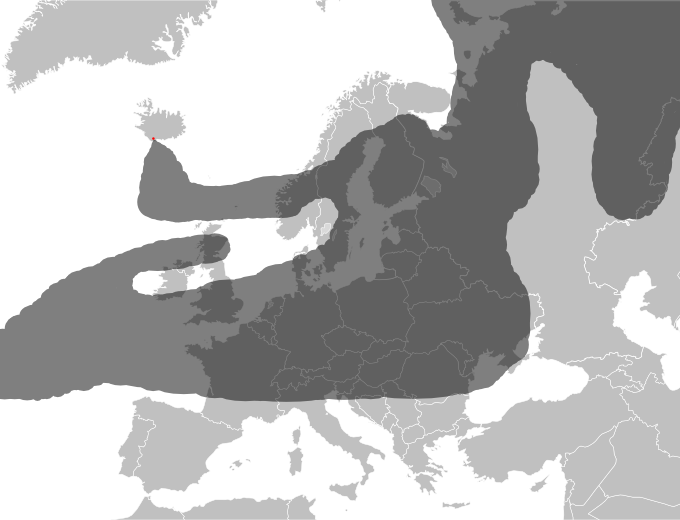Aviation experts are warning that air traffic across western Europe may continue to be affected by an Icelandic volcano, which has been billowing clouds of ash and spreading it throughout the region.

Experts say that the Eyjafjallajokull volcano, located in Iceland, continues to have "sporadic eruptions"; dark ash clouds have been moving south and east of the area, causing mass flight cancellations from the UK to Russia over fears that the soot may be catastrophic to planes - such as causing engines to fail in-flight or severely reducing the pilot's visibility.
The ash clouds are drifting between six to nine thousand meters above the ground, and are moving eastwards, over northern France and Austria and towards Russia at about 40 kilometers per hour.
Already, thousands of passengers have been left stranded around the world, unable to travel to and from various points in Europe. The continent's air-traffic control center forecast 17,000 flights to be canceled on Friday alone, and indicated there could be further disruption on Saturday. The cancellations are costing airlines about US$200 million daily, the International Air Transport Association reports.
A global association of air traffic control companies commented that ash clouds would probably continue to affect flights for some time. "The knock-on effect of the volcanic ash plume over northern Europe is likely to disrupt European airspace for several days," the Civil Air Navigation Services Organization said in a statement. "Traffic will have to be reorganized and rerouted and flights preplanned, all on a dynamic and quite unpredictable basis."
"The skies are totally empty over northern Europe," said Eurocontrol's deputy head, Bryan Flynn. The agency added that about 16,000 of Europe's average 28,000 daily flights were canceled yesterday, twice as many as were called off on Thursday.
Dark volcanic ash clouds visible above Bergen, Norway.
In a special report, Wikinews takes a look at how different countries have been affected by this event.
Icelandic airports are open, despite being in such close proximity to the billowing volcano, as the winds are blowing ash clouds away from the vicinity.
The Icelandic Met Office's Matthew Roberts, told the BBC that the volcano hasn't been expending as much ash, and that the eruption was slowing down.
Icelandic officials are urging local residents with respiratory problems to refrain from going outdoors, and encourages the use of protective goggles and masks to those who do go out.
Experts suggest that occasional disruptions are possible throughout the next half year, should Eyjafjallajokull continue to erupt. Another concern is that it may trigger an eruption from the larger Katla volcano nearby, which has occurred every time Eyjafjallajokull has erupted for the past few centuries.
Polish authorities have suggested that they will delay the funeral of deceased president Lech Kaczynski, who died in a plane crash in Russia last week. Many world leaders planning to attend the funeral might be prevented from doing so due to the ash clouds. Poland was one of twelve to close down most or all of its airspace.
The president's family, however, has insisted the ceremony, to be held in Krakow, proceed as planned.
The UK's National Air Traffic Service (NATS), says that its restrictions on airspace in the country would remain in effect until no sooner than 13.00 UTC today. Travel bans for Northern Ireland and Scotland have been lifted, although NATS stressed that this does not necessarily mean flights to and from the area will actually resume.
The Ryanair airline, meanwhile, canceled all its northern Europe flights until 13.00 on Monday. British Airways called off all of its flights from London airports.
UK ferry operators saw a jump in bookings as stranded air travelers sought other ways to cross the English Channel.
A spokesman with the British Civil Aviation Authority commented that, [i]n terms of closure of airspace, this is worse than after 9/11. The disruption is probably larger than anything we've seen."
A correspondent for Al Jazeera reporting from London Heathrow airport described stranded travelers attitude as being "increasingly frustrated". He remarked: "Some sources I've been speaking to have been indicating that this will probably be extended further. There may be intermittent disruptions to flights for months to come."



No comments:
Post a Comment